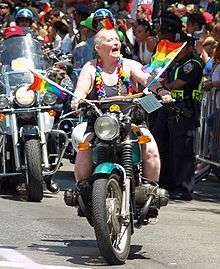Dyke (slang)

The term dyke or dike is a slang noun meaning lesbian; it is also a slang adjective describing things associated with lesbianism. It originated as a derogatory label for a masculine, tomboyish, or butch woman; while this usage still exists, the term dyke has been reappropriated to an extent as a word implying assertiveness and toughness, or simply as a neutral synonym for lesbian.[1]
Origins
The origin of the term is obscure, and many theories have been proposed.[2][3] The Oxford English Dictionary notes the first attestation as Berrey and Van den Bark's 1942 American Thesaurus of Slang.[4] There, "dike" was the more common term.[4] From the mid-19th century to the early 20th century, "dike" had been American slang for a well-dressed man, with "diked out" and "out on a dike" indicating a young man was in his best clothes and ready for a night on the town. The etymology of that term is also obscure, but may have originated as a Virginian variant of "deck" and "decked out".[5]
However, the term "bulldyker" preceded "dyke" in print, appearing in Harlem Renaissance novels in the 1920s.[2] Claude McKay's 1928 Home to Harlem includes the passage that lesbians are "what we calls bulldyker in Harlem... I don't understan'... a bulldyking woman." From the context in the novel, the word was considered crude and pejorative at the time. This may be related to the late-19th-century slang use of "dike" ("ditch") for the vulva.[6] "Bull" ("male cattle") being used in the sense of "masculine" and "aggressive" (e.g., in bullish), a "bulldyke" would have implied (with similar levels of offensiveness) a "masculine cunt". Other theories include that "bulldyker" derived from "morphadike", a dialect variant of "hermaphrodite", used for homosexuals in the early 20th century; that it was a term for stud bulls and originally applied to sexually successful men;[7] or that it was a dialectical corruption of the rebel Celtic queen Boadicea.[1][3][8]
Increasing acceptance

In the late 20th and early 21st century, the term was reclaimed by many lesbians. Examples in the culture include the comic strip "Dykes to Watch out For" and the traditional Dykes on Bikes that lead pride parades.
Matters came to a head when the United States Patent and Trademark Office denied lesbian motorcycle group Dykes on Bikes a trademark for its name, on the grounds that "dyke" was an offensive word. In 2005, after a prolonged court battle involving testimony on the word's changing role in the lesbian community,[9] the Trademark Trial and Appeal Board permitted the group to register its name.Trademark Office Says Yes to "Dykes on Bikes"
"Dyke Marches" have become a popular Pride event nationwide. They are generally non-commercial, often in sharp contrast to corporate-sponsored pride events, and are usually inclusive of lesbian, bi, and trans women.
Dyke bars
A dyke bar is a term used to describe any bar or club in which lesbians often attend, but can also indicate a "tougher" establishment (in terms of the patrons or environment). As with the stand-alone word "dyke," the term is considered not only slang, but a potential slur when used by non-LGBT persons.
See also
References
- 1 2 Krantz, Susan E. (1995). "Reconsidering the Etymology of Bulldike". American Speech. 70 (2): 217–221. doi:10.2307/455819.
- 1 2 Spears, Richard A. (1985). "American Speech". American Speech. 60 (4): 318–327. doi:10.2307/454909. JSTOR 454909.
- 1 2 Dynes, Wayne R. (1991). The Encyclopedia of Homosexuality. Garland Publishing. pp. 335–336.
- 1 2 "dyke, n.³", Oxford English Dictionary, Oxford: Oxford University Press, 1972.
- ↑ "dyke, n.²", Oxford English Dictionary, 2nd ed., Oxford: Oxford University Press, 1989 [1933].
- ↑ "dyke", Online Etymology Dictionary.
- ↑ Herbst, Phillip (2001). Wimmim, Wimps, & Wallflowers: An Encyclopaedic Dictionary of Gender and Sexual Orientation Bias. Intercultural Press. p. 332. ISBN 978-1-877864-80-3..
- ↑ Judy Grahn, Another Mother Tongue.
- ↑ Anten, Todd (2006), "Self-Disparaging Trademarks and Social Change: Factoring the Reappropriation of Slurs into Section 2(a) of the Lanham Act(currently unavailable as archive only includes records within 3 years of present)" (PDF), Columbia Law Review, 106: 338, retrieved 2007-07-12
- Knadler, Stephen P. (1963), "Sweetback Style: Wallace Thurman and a Queer Harlem Renaissance" MFS Modern Fiction Studies - Volume 48, Number 4, Winter 2002, pp. 899–936
External links
| Look up dyke in Wiktionary, the free dictionary. |
- Etymology of dyke on the Online Etymology Dictionary
